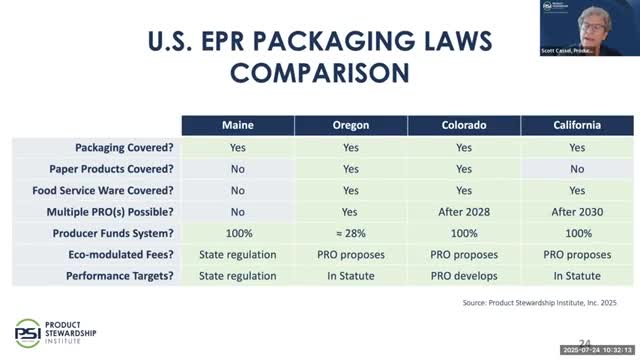Multi-State Stakeholders Aim to Harmonize Producer Responsibility System for Packaging
July 26, 2025 | Massachusetts Department of Environmental Protection, Executive , Massachusetts
This article was created by AI summarizing key points discussed. AI makes mistakes, so for full details and context, please refer to the video of the full meeting. Please report any errors so we can fix them. Report an error »

On July 24, 2025, the Massachusetts Department of Environmental Protection (MassDEP) convened an Advisory Group focused on Extended Producer Responsibility (EPR) for plastics and packaging. The meeting highlighted significant discussions around the harmonization of EPR systems across various states, aiming to streamline processes and reduce confusion for producers.
A key theme of the meeting was the phased implementation of EPR systems. Participants noted that producers in states like Oregon, Minnesota, and Maryland are gradually increasing their financial contributions to recycling systems, starting at 50% and potentially reaching up to 90% over time. This gradual approach is designed to ease the transition for producers while ensuring that they take on more responsibility for the lifecycle of their products.
The meeting also emphasized the importance of harmonization among states. With seven states beginning to align their EPR frameworks, there is a concerted effort to standardize various elements, including the scope of materials covered, reporting requirements, and financial responsibilities. This harmonization is expected to lower costs for the industry and foster a more cooperative atmosphere between producers and regulators.
Additionally, the discussions acknowledged that EPR is not a standalone solution. The meeting addressed the need for complementary policies, such as plastic bag bans and household hazardous waste regulations, which will work alongside EPR initiatives to create a comprehensive approach to waste management.
As the group prepares for six more meetings scheduled from September to December 2025, the focus will remain on refining these systems and ensuring that all stakeholders are engaged in the process. The goal is to create a more efficient and effective EPR framework that benefits both the environment and the economy.
In conclusion, the MassDEP meeting underscored the ongoing efforts to enhance EPR systems in Massachusetts and beyond. By fostering collaboration and harmonization among states, the initiative aims to create a more sustainable future for packaging and plastics management.
A key theme of the meeting was the phased implementation of EPR systems. Participants noted that producers in states like Oregon, Minnesota, and Maryland are gradually increasing their financial contributions to recycling systems, starting at 50% and potentially reaching up to 90% over time. This gradual approach is designed to ease the transition for producers while ensuring that they take on more responsibility for the lifecycle of their products.
The meeting also emphasized the importance of harmonization among states. With seven states beginning to align their EPR frameworks, there is a concerted effort to standardize various elements, including the scope of materials covered, reporting requirements, and financial responsibilities. This harmonization is expected to lower costs for the industry and foster a more cooperative atmosphere between producers and regulators.
Additionally, the discussions acknowledged that EPR is not a standalone solution. The meeting addressed the need for complementary policies, such as plastic bag bans and household hazardous waste regulations, which will work alongside EPR initiatives to create a comprehensive approach to waste management.
As the group prepares for six more meetings scheduled from September to December 2025, the focus will remain on refining these systems and ensuring that all stakeholders are engaged in the process. The goal is to create a more efficient and effective EPR framework that benefits both the environment and the economy.
In conclusion, the MassDEP meeting underscored the ongoing efforts to enhance EPR systems in Massachusetts and beyond. By fostering collaboration and harmonization among states, the initiative aims to create a more sustainable future for packaging and plastics management.
View full meeting
This article is based on a recent meeting—watch the full video and explore the complete transcript for deeper insights into the discussion.
View full meeting
